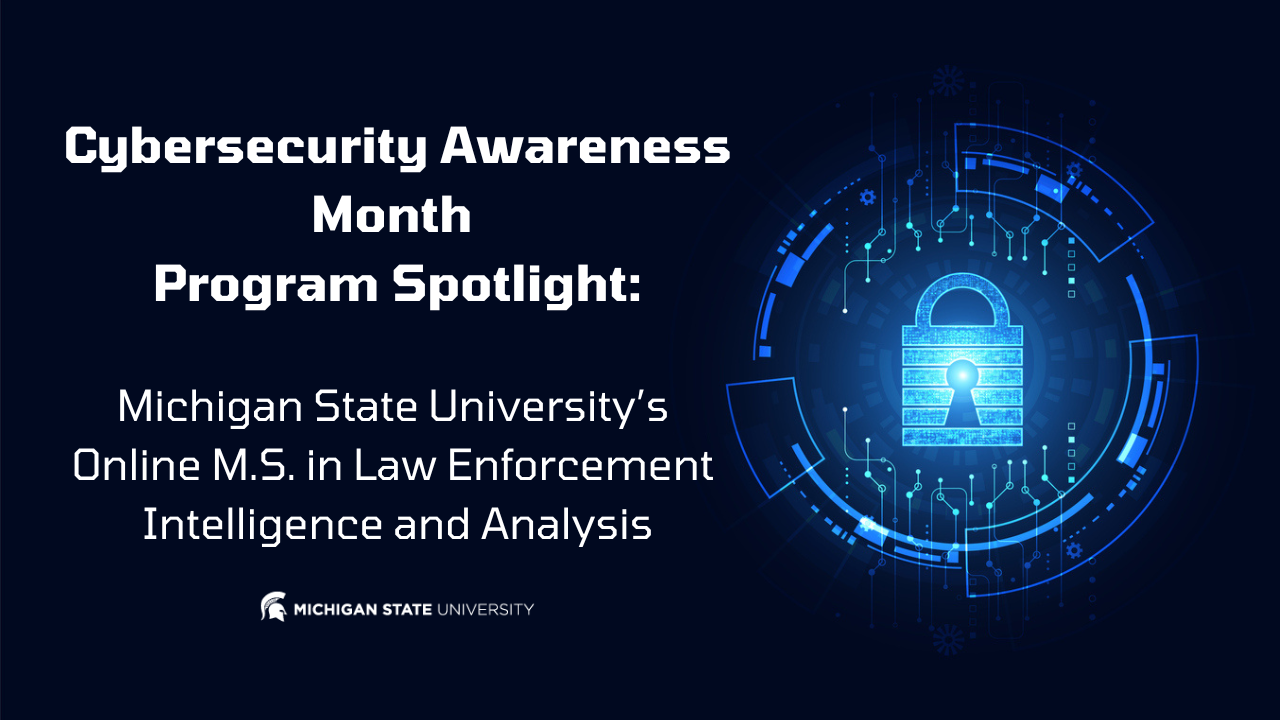Cybersecurity Awareness Month Program Spotlight: Michigan State University’s Online M.S. in Law Enforcement Intelligence and Analysis
 Michigan State University’s online M.S. in Law Enforcement Intelligence and Analysis program is the culmination of collaborative efforts from the U.S. Drug Enforcement Administration, the Department of Homeland Security, the National Institute of Justice, and nationally and internationally recognized law enforcement intelligence expert Dr. David Carter.
Michigan State University’s online M.S. in Law Enforcement Intelligence and Analysis program is the culmination of collaborative efforts from the U.S. Drug Enforcement Administration, the Department of Homeland Security, the National Institute of Justice, and nationally and internationally recognized law enforcement intelligence expert Dr. David Carter.
An expert in policing issues, violent crime control, law enforcement intelligence, and counterterrorism, Dr. Carter brought his knowledge and experience in developing the field of law enforcement intelligence to MSU, where he and his colleagues prepare new generations of intelligence analysts to contribute to antiterrorism efforts, SWAT operations, thought leaders in criminal justice.
 David L. Carter
David L. CarterDavid L. Carter is the director of the Intelligence Program at Michigan State University and a former Kansas City, Missouri, police officer. He is an instructor in the Bureau of Justice Assistance State and Local Anti-Terrorism Training (SLATT) program and the author of “Law Enforcement Intelligence: A Guide for State, Local and Tribal Law Enforcement.” With decades of intelligence experience, Dr. Carter is a frequent speaker, consult, and trainer for the FBI, the DHS, and the Justice Department.
MSU, the Drug Enforcement Administration, and 9/11: The Birth of a Program
As Dr. Carter explains, Michigan State University’s master’s program is uniquely focused on law enforcement intelligence, as opposed to the national security intelligence emphasis of other programs around the country.
“At Michigan State, we have a history as the oldest degree-granting criminal justice program. As for the intelligence program, we kind of took that as part of our DNA and focused on law enforcement intelligence.”
The genesis of the program occurred in the late 1980s when Drug Enforcement Administration requested help from the university in developing their intelligence unit.

“That’s really where I started learning more about intelligence analysis,” says Dr. Carter, “and what I found was not a lot was written about it. So, I did the research and started to develop it somewhat out of experience.”
This practical, ground-up approach to problem-solving led Dr. Carter to design the program around law enforcement and the intelligence agencies that first expressed the need for intelligence and analysis.
“All of that changed notably after 9/11,” Dr. Carter notes. “Soon after the terrorist attacks, it became recognized that the intelligence process was going to be critical for law enforcement and counterterrorism. The Justice Department created a formal advisory body called, initially, the Global Intelligence Working Group, and then later the Criminal Intelligence Coordinating Council, or CICC.”
According to Dr. Carter, the intent of the advisory body was to bring professionals together to develop standards and best practices for how U.S. police departments should implement and design the intelligence process to ensure that it was not only efficient and effective, but that it also protected Americans’ constitutional rights.
“I was a member of the advisory boards from the beginning and able to contribute and participate to ensure that we achieved this goal.”
When the Department of Homeland Security later granted its support to the CICC, Dr. Carter had several grants from DHS to provide intelligence training across the country to law enforcement agencies.
“I also had grants from the National Institute of Justice to do research on fusion centers and how they were operating,” says Dr. Carter. “So, collectively, all these things together inform our curriculum for the LEIA program so that it meets national standards and is consistent with my best practices.”

A World Without Law Enforcement Intelligence
According to the Bureau of Justice Statistics’ 2022 National Crime Victimization Survey, which includes data on nonfatal crimes against people aged 12 or older, the rate of violent victimization increased from 16.5 victimizations per 1,000 persons in 2021 to 23.5 per 1,000 in 2022.
Furthermore, roughly 10 percent of these incidents involved a firearm in 2022, which is a 7 percent increase from 2021, and an estimated 3.5 million people aged 12 or older experienced at least one violent crime in the United States in 2022.
These key takeaways from the U.S. Department of Justice are crucial to the development of policy and law at the local, state, and national levels. Without law enforcement intelligence, policymakers would be unable to address threats to the public.
As Dr. Carter explains in his book, Law Enforcement Intelligence Operations, “Intelligence not only fulfills the role of investigative support, it is also an important management tool for decision making, resource allocation, deployment, and a spate of other administrative responsibilities.”
Dr. Carter notes the importance of intelligence analysis and how it informs the criminal justice system.
“Intelligence analysis is virtually the scientific approach to problem solving. It’s research, and that’s what we do in universities. We do a great deal of research,” explains Dr. Carter.
“We do not do theoretical research, but instead we’re doing policy research. That’s much of what intelligence analysis is: it’s applying research methods for data gathering to analysis,” he says. “It’s using this good research but integrating it with policy and with law.”
And Dr. Carter understands the importance of using the data he and his colleagues and students collect ethically and responsibly.
“There’s probably no aspect of intelligence analysis that is more critical—and controversial—than ensuring the protection of privacy, civil rights, and civil liberties. We try to integrate all of these—and I think we do it effectively—in order to say: ‘How can we have robust data gathering and analysis while, at the same time, ensuring the protection of constitutional rights?’
And that’s a core element that permeates our program. So it’s policy oriented, it’s research oriented, and it’s constitutionally oriented.”
Careers for Law Enforcement Intelligence and Analysis Program Graduates
The program initially focused on counterterrorism, but as it evolved, the program faculty expanded its scope. They considered how the intelligence process affected other crimes and investigations.
“In a project I did for the Bureau of Justice Assistance, for example, we found that the most successful homicide units with the highest clearance rates all employ intelligence analysts that work with the homicide unit,” says Dr. Carter.
He points to the broad applications of intelligence units, including real time crime centers and large growth in the private sector.
“It’s not just intelligence units within police departments. We’re also seeing private companies that want to hire intelligence analysts. For example, we’ve had a number of graduates who’ve been placed with banks to support the Bank Secrecy Act in preventing money laundering and to detect transactions that may be involved in terrorism or drug trafficking.”

According to Dr. Carter, businesses from Walmart to Disney hire intelligence analysts to protect their customers, their supply chains, and their properties.
“While the basis of the program was established with law enforcement and intelligence analysts in mind, we have found that the private sector has embraced our graduates and the need for intelligence analysts as well,” Dr. Carter says.
Law Enforcement Intelligence vs. National Security Intelligence
It’s important to note that law enforcement intelligence is not synonymous with national security intelligence.
The responsibilities that fall under law enforcement intelligence include:
- Obtaining and Integrating Information
- Identifying Crimes and Crime Trends
- Identifying Criminals
- Developing Cases
- Providing Investigative Support
- Projecting Crime Trends
Law enforcement intelligence is crime-driven, whereas national security intelligence depends upon presidential policy and the executive branch of the federal government.
Furthermore, law enforcement intelligence focuses on the prosecution of criminal cases and the allocation of law enforcement resources. National security intelligence, on the other hand, addresses threats to the security of the nation.







